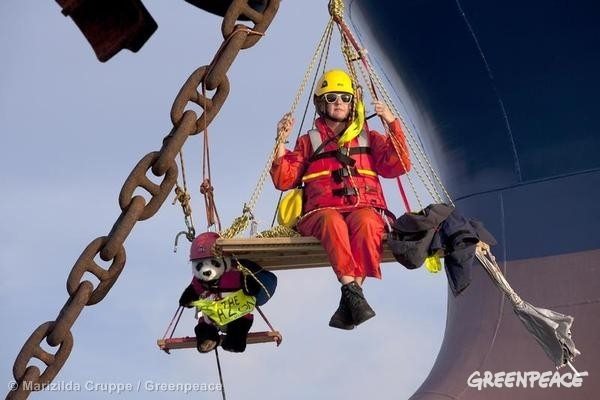I was recently humbled to accept an invitation from UN Women Executive Director, Michelle Bachelet, to join her Global Civil Society Advisory Group. In reflecting on the appointment, I’d like to call to your attention the passionate environmentalist and politician Wangari Mathaai.

Blog by Kumi Naidoo, Executive Director of Greenpeace International
It’s almost a year since Wangari’s passing; I spoke at memorial services for her in both Durban and London. As we enter a critical era for both environmental and gender rights, women like Wangari become important not only for the work they do and ideals they uphold, but for their lasting memory as beacons for inspiration, action, and change.
UN Women was created only two years ago next month, and its aim was to accelerate UN goals promoting gender equality and the empowerment of women. I accepted the invitation because I believe Gender Equality is not only a basic human right, and that its achievement has enormous positive ramifications, but because there is an oft-unspoken outrage when it comes to women who suffer most from environmental injustices.
I believe that all of us have to commit to end the ongoing discrimination and marginalization of women, and acknowledge how gender injustice is a prominent factor in the world and power relations of our contemporary societies. It may surprise you to consider that climate change, for instance, is not an equal opportunity phenomena. By this I mean that women are affected to a much greater degree by climate change and the socioeconomic and environmental disasters it brings. To be sure, climate change is a development challenge, and inequality and poverty strongly influence how much people suffer from climate change. Seventy percent of the 1.3 billion people living in poverty worldwide are women, and they bear the brunt of the impacts wreaked by climate change, be it drought or flood, but especially rain-fed agriculture (which it undermines tremendously).
Although women comprise 50-80% of the world’s food producers, they in fact own less that 10% of land worldwide. Once again, when it comes to environmental change, catastrophic or otherwise, it is their livelihoods that are compromised most. Furthermore, as food production is seen as the responsibility of women, there is evidence that domestic violence increases when food is scarce. It is not unheard of that such women become enslaved in prostitution rackets in a desperate bid to feed their families or to pay off debts.
In terms of energy, it´s the same story. Two billion people in the world do not have access to sustainable energy sources and in rural contexts, women are generally tasked with collecting firewood. They spend between two and nine hours a day doing so. Close to 80% of rural women in Asia, 60% in Africa and 40% in Latin America are affected by firewood shortages. Worldwide, pollution in homes caused by the smoke from burning firewood kills about two million women and children a year. Miscarriage in Uttarachal, a rural area in India, is 30% higher than the national average due to the very heavy weights women are burdened to carry as they collect water and firewood. It’s time to connect the dots, and take action.
On 17th May, the day my appointment to the UN Women Advisory Board was announced, I saw a photo of Emma Briggs, a crew member on board the iconic Greenpeace ship, Rainbow Warrior, which is currently on tour in the Amazon. The photo shows Emma hanging from the anchor chain of the cargo vessel Clipper Hope, near Sao Louis in Brazil. Emma is sitting on high, and duly reporting to the world of her travails: ‘There is more life, and more different types of life, in this forest than anywhere else, and seeing it transformed into wasteland is one of the saddest images of what is happening to our planet,’ she wrote. ‘The rate of deforestation of the Amazon is once again increasing because of recent government decisions.’ Women are an integral part of our organization today, and women perform many vital roles in the worlds of politics and business. This is not the case in all parts of the world.
I will join Emma and other Greenpeace and global activists in Brazil in one weeks’ time for the Rio Earth Summit, and together we will raise our voices with Brazilians to achieve zero deforestation by 2015. I will do so with the ideals of Wangari Mathaai in my mind, and the vision and hope that we will one day see a world in which women are no less respected, empowered or afforded opportunity than the men they share the earth with.
Kumi became Executive Director of Greenpeace International on November 16, 2009


